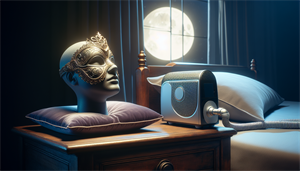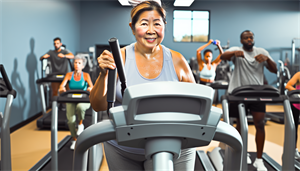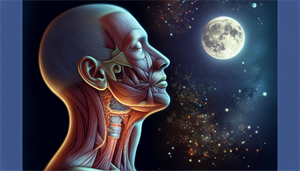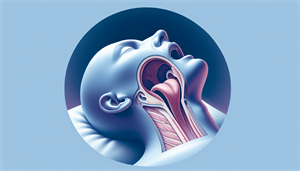If you’re grappling with sleep apnea, you’ll be familiar with the disruptive, often alarming breathing pauses that punctuate your sleep. This chronic condition affects millions worldwide, placing them at risk of serious health complications. However, the good news is that although sleep apnea may not be curable, it can be managed effectively with the right treatment and lifestyle modifications, leading many to wonder, “can sleep apnea go away?”
Key Takeaways
-
Sleep apnea, including obstructive and central types, is a chronic condition, but its severity can be lessened with treatment and lifestyle changes rather than being considered a permanent and static condition.
-
Various treatments, such as CPAP therapy, oral appliances, and surgery, are available and differ in suitability and effectiveness based on individual patient circumstances, with CPAP being generally more effective in reducing apnea events.
-
Lifestyle modifications, including weight loss, quitting smoking, and limiting alcohol intake, significantly improve sleep apnea symptoms and can enhance the effectiveness of medical treatments.
Is Sleep Apnea a Permanent Condition?

Sleep apnea, a condition characterized by repeated interruptions in breathing during sleep, comes in various forms, including obstructive sleep apnea, where the throat muscles intermittently relax and block the airway, and central sleep apnea, which occurs when your brain doesn’t send proper signals to the muscles controlling your breathing. Obstructive sleep apnea occurs in many individuals, but despite being a chronic condition, sleep apnea doesn’t mean a lifelong battle with disrupted sleep and daytime fatigue. Effectively managing this condition’s symptoms is possible with the right treatment and lifestyle adjustments.
Conventional wisdom might lead you to think that to lose weight could cure sleep apnea. Unfortunately, this is not entirely accurate. Although weight loss may not eliminate sleep apnea, it can surely lessen the severity of its associated symptoms.
Coupled with other beneficial lifestyle changes like regular exercise, a healthy diet, and the avoidance of alcohol and sedatives like sleeping pills, weight loss can contribute significantly to mitigating the severity of sleep apnea symptoms and its associated risks.
The Reality of Treating Sleep Apnea

Several options are available for treating sleep apnea. Not all treatments are suitable for everyone, and the effectiveness varies depending on the individual’s specific circumstances. The main treatment options include Continuous Positive Airway Pressure (CPAP) therapy, oral appliances, and surgery, each with its own benefits and limitations.
Continuous Positive Airway Pressure (CPAP) Therapy
CPAP therapy is widely used to treat sleep apnea. It helps to keep the airways open during sleep, allowing for easier breathing. It involves wearing a mask over the nose or mouth during sleep, which is connected to a machine delivering a continuous airflow into the nose. This consistent air pressure helps keep the throat open, thereby preventing interruptions in breathing during sleep. Consistent use and appropriate maintenance are key to successful CPAP therapy. It’s crucial to ensure a proper fit for the CPAP mask, as comfort and a good seal are essential for effective therapy. Some individuals may benefit from accessories like comfort pads and heated hoses for an improved CPAP experience.
Notably, most private health insurance policies generally cover CPAP machines and associated equipment, making it a feasible treatment option for many. However, the level of coverage may vary depending on the specific insurance plan, making it crucial to check your policy’s details.
Oral Appliances and Their Role
For some individuals, oral appliances may be a more suitable treatment option. These are specialized mouthpiece devices designed to:
-
position the jaw and tongue in a way that alleviates pressure on the windpipe
-
provide potential benefits for individuals with sleep apnea
-
be especially beneficial for those with mild obstructive sleep apnea
-
help to reduce snoring and improve sleep quality.
Once the appropriate fit for the oral appliance has been achieved, it’s important to maintain regular follow-up appointments with your dentist, particularly during the first year. This facilitates the confirmation of the appliance’s sustained effectiveness and the monitoring of any symptom improvements. However, it’s important to bear in mind that while oral appliances can be beneficial, CPAP therapy is generally considered more effective in reducing apnea events.
Surgical Options: A Potential Solution?
For some individuals, especially those who haven’t seen significant symptom improvements with treatments such as CPAP or oral appliances, surgical intervention may be an option. Candidates for surgery typically experience:
-
Breathing pauses during sleep
-
Fatigue throughout the day
-
Inability to tolerate CPAP or oral appliances
-
Anatomical narrowing of the pharynx
There are various surgical procedures available for the treatment of sleep apnea, including Uvulopalatopharyngoplasty (UPPP), Laser or cautery-assisted uvulopalatoplasty (LAUP), and Tracheostomy. The success rate of sleep apnea surgery can vary, and it’s important to note that even when the surgery is initially effective, there is a possibility of sleep apnea recurring in the future. Thus, surgical intervention should be carefully considered and discussed with your healthcare provider.
Lifestyle Modifications That Can Make a Difference

Although medical treatments are key in managing sleep apnea, lifestyle modifications also play a vital role. By maintaining a healthy weight, quitting smoking, and limiting alcohol consumption, individuals with sleep apnea can significantly improve their symptoms and overall health.
The Impact of Losing Weight
Losing weight can have a profound impact on sleep apnea symptoms. There is a strong link between obesity and sleep apnea, as excess body weight can lead to narrowing of the airway and increased pressure on the upper airways. Losing weight can alleviate the additional pressure around the lungs and airways, promoting better airway openness during sleep. Even a mere 10% decrease in body weight can result in notable reductions in sleep apnea symptoms, and in certain instances, complete resolution of the condition.
Employing strategic weight loss methods can further assist in managing obstructive sleep apnea. These include:
-
Sleeping longer hours
-
Avoiding eating within 3-4 hours of bedtime
-
Avoiding alcohol close to bedtime
-
Keeping the nose clear and open
-
Following a sleep apnea weight loss diet that includes fewer calories and more nutrients
Combining these strategies with CPAP therapy can enhance the management of sleep apnea.
The Benefits of Quitting Smoking
Significant improvement in sleep apnea symptoms can be achieved by quitting smoking. This is because smoking contributes to challenges in initiating and sustaining sleep, as well as inducing inflammation and blockage of the upper airways. It’s not just about the smoke; nicotine influences the local inflammatory process, leading to the manifestation of symptoms associated with sleep apnea. Some benefits of quitting smoking for sleep apnea include:
-
Improved sleep quality
-
Reduced snoring
-
Decreased risk of respiratory infections
-
Better oxygen flow during sleep
Quitting smoking is an important step in managing sleep apnea and improving overall health.
Quitting smoking can help individuals in the following ways:
-
Reduce certain symptoms and the severity of sleep apnea
-
Decrease the risk of condition development
-
Improve sleep quality by reducing sleep apnea-associated nocturnal hypoxia and hypercarbia
-
Reduce the susceptibility to respiratory infections by decreasing upper respiratory problems
Alcohol and Sleep Apnea: Understanding the Connection
Alcohol has a complex relationship with sleep apnea. It can exacerbate sleep apnea symptoms by:
-
Inducing relaxation of the muscles in the airway
-
Resulting in their sagging and obstructing the airways
-
The sedative effects of alcohol and its influence on the relaxation of airway muscles make it a factor in the worsening of sleep apnea symptoms.
Symptoms associated with alcohol-induced sleep apnea include heightened snoring, diminished sleep quality, decreased oxygen levels during sleep, and repeated breathing disturbances. Therefore, it is recommended for people with sleep apnea to limit their alcohol intake to one or two drinks and refrain from consuming alcohol at least 4 hours before bedtime.
When Might Sleep Apnea Improve or Resolve?

While sleep apnea is typically a chronic condition, there are cases in which it may improve or even resolve. For instance, surgical procedures like adenotonsillectomy, which involves the removal of the tonsils and adenoids, or orthodontic treatments such as oral appliance therapy, are often effective in resolving sleep apnea in young children.
In adults, significant lifestyle changes can contribute to the enhancement or potential alleviation of sleep apnea, as well as reduce the risk of developing sleep apnea. These changes include:
-
Maintaining a healthy weight
-
Engaging in regular exercise
-
Adopting a nutritious diet
-
Refraining from habits such as smoking and excessive alcohol consumption
Recognizing and Diagnosing Sleep Apnea

Identifying and taking steps to diagnose sleep apnea is a vital part of effective condition treatment and management. Sleep apnea is diagnosed through overnight sleep testing, which can be conducted at a sleep center or through home sleep testing. If the results from home sleep testing are not typical, further polysomnography at a sleep center may be recommended.
Preparation for your diagnostic appointment with a sleep specialist is also necessary. This includes:
-
Inquiring about any necessary advance preparations, such as potential dietary modifications or maintaining a sleep diary
-
Compiling a list of your symptoms and any concerns or questions you may have about sleep apnea
-
If diagnosed with obstructive sleep apnea, you may be advised to seek consultation with an ear, nose, and throat specialist to assess potential blockages in the nose or throat.
The Risks of Untreated Sleep Apnea
Serious health risks can result from untreated sleep apnea, especially in cases of severe sleep apnea. It can have a substantial detrimental effect on cardiovascular health, leading to an increased risk of:
-
high blood pressure
-
coronary heart disease
-
heart failure
-
atrial fibrillation
-
hypertension
-
stroke
-
heart attacks
Your quality of life can also be impacted by untreated sleep apnea. Symptoms such as recurrent sleep disruptions, decreased oxygen levels, excessive daytime sleepiness, fatigue, headaches, and poor sleep quality can lead to impaired concentration and memory, as well as an increased risk of automobile accidents. Furthermore, sleep apnea may contribute to depressive symptoms, further reducing your quality of life.
Untreated sleep apnea has also been associated with an elevated risk of cognitive and mental health issues, such as depression, suicidal ideation, anxiety, and other psychological challenges, making sleep apnea worse.
Navigating Treatment Options with Your Healthcare Provider
Choosing and understanding the appropriate treatment options for sleep apnea can be rather overwhelming. Hence, having an open and comprehensive discussion with your healthcare provider is imperative. They can guide you through the various treatment options, explain their benefits and limitations, and help identify the most suitable and efficient approach to managing your sleep apnea. Some common treatment options for sleep apnea include:
-
Continuous positive airway pressure (CPAP) therapy
-
Oral appliances
-
Surgery
-
Lifestyle changes
By discussing these options with your healthcare provider, you can make an informed decision about the best treatment plan for your specific needs.
Create a list of inquiries to discuss with your healthcare provider before your consultation. These may include:
-
Questions about the necessary tests for confirmation of sleep apnea
-
Available treatment options
-
Success rates associated with each treatment option
-
Potential lifestyle adjustments to improve sleep apnea
-
The frequency of follow-up appointments for progress monitoring
You should also document any medications or supplements you are currently using and discuss them with your healthcare provider.
Summary
In summary, sleep apnea is a chronic condition that can significantly impact your health and quality of life. While it may not be curable, it can be effectively managed with the right treatment and lifestyle modifications. From CPAP therapy and oral appliances to surgical interventions and lifestyle changes, there are multiple strategies to alleviate sleep apnea symptoms. Recognizing the symptoms, getting a proper diagnosis, understanding the risks of untreated sleep apnea, and discussing treatment options with your healthcare provider are all critical steps towards managing this condition. Remember, the journey towards better sleep and health starts with you.
Frequently Asked Questions
Can sleep apnea go away on its own?
Sleep apnea rarely, if ever, goes away on its own and typically requires lifestyle changes or specialized treatment to improve.
How long does it take to reverse sleep apnea?
Treating obstructive sleep apnea with CPAP for just 12 months can almost entirely reverse the damage done to white matter, as shown by research.
Can sleep apnea be cured by losing weight?
Losing weight can significantly alleviate the symptoms of sleep apnea, although it may not completely cure the condition.
What is the most effective treatment for sleep apnea?
The most effective treatment for sleep apnea is CPAP therapy, followed by oral appliances and surgery. Find the best treatment with your doctor's guidance.
What are the risks of untreated sleep apnea?
Untreated sleep apnea can lead to serious health risks such as cardiovascular issues, cognitive impairment, and reduced quality of life. It is important to seek treatment to avoid these complications.
Does sleep apnea get better or worse in certain temperatures?
Patients with untreated obstructive sleep apnea sleep more, have better quality sleep, and feel more awake in the morning after sleeping in a room that's about 61°F (cool), compared to sleeping in a room that's about 75°F (warm). However, their sleep apnea gets worse when the room is cool (61°F) or slightly warmer (68°F) compared to when it's warm (75°F).
References
- Ambient Temperature and Obstructive Sleep Apnea: Effects on Sleep, Sleep Apnea, and Morning Alertness. 2012 Apr 1; 35(4): 513–517. https://www.ncbi.nlm.nih.gov/pmc/articles/PMC3296793/


